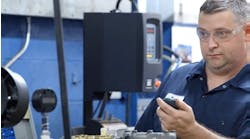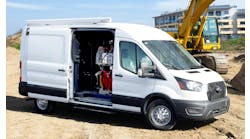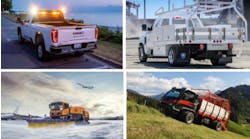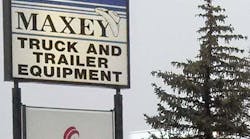Poudre River flood of 2013 has minimal impact on Maxey Truck & Trailer Equipment as its sights remain set on showroom expansion
WHEN the Poudre River flooded last year, it put more than 14 inches of water in the parts showroom of Maxey Truck & Trailer Equipment. But the optimists there simply saw it as a way to get better.
“It was an inconvenience for us,” says Carl Maxey, general manager of the multi-faceted company in Fort Collins, Colorado. “But for some people, it was devastating.”
As the river continued to rise, irrigation companies were asked to take as much water as they could handle in an effort to hold back as much of the torrent as possible. Unfortunately, a diversion ditch backed up, sending floodwaters into the parts room—the lowest structure on the property.
When the staff realized the likelihood that the river could reach the showroom, they began moving products from the lower shelves. That helped reduce the damage, as the water stopped rising after reaching a depth of about 18 inches.
When the water receded, Maxey was left with a parts room that needed cleaning and some inventory to replace, but damage was light compared to other businesses in the area.
Recovering from the flood could have provided to Maxey with an opportunity to upgrade the parts department, but that was something the company had recently completed.
“We doubled the size of our showroom,” Maxey says. “We plan to double it again in two years. The population around here has grown and will continue to grow. We expect to have twice the number of people in our trade area 20 years from now that we do today. ”
The recent parts showroom expansion project involved making display space out of an area that was serving as warehouse space.
“We wanted to make the showroom even bigger, but we couldn’t afford to give up any more warehouse space than what we did,” he says. “Basically, we moved a wall and brought some shelves out of the warehouse and into the showroom. We won’t have to face that sort of limit a couple of years from now. We are going to build a new facility on property that we have already purchased. Parts will occupy a major portion of that new building.”
The 7 ½-acre site is on Interstate 25, the primary north-south artery that runs from the Canadian border and connects the major markets along the front range of the Rocky Mountains. The improved exposure should help drive sales—including parts sales.
So what makes parts so important? At Maxey, it’s a source of sales, but it also is a boost to the service department.
“The two work well together,” he says. “We sell a fair number of parts, and we have a lot of loyal parts customers. But there are a lot of jobs that are a little more than some parts customers want to take on. That’s where our service department comes in. When your parts department does a good job, it helps your service department, too.”
Maxeyco, the corporate umbrella, has a truck equipment operation in addition to a manufacturing company that produces light-duty trailers for commercial and agricultural applications. The firm has been a player in truck equipment and light trailer manufacturing for many years. The company proudly displays a Distributors Association decal (the former name for the NTEA) on its front window, and Carl Maxey has served extensively on the board of directors of the National Trailer Manufacturers Association—including a term as president in 2005-2006.
Because of its multiple markets, the parts department stocks a slightly different mix of parts than a traditional truck equipment distributor or a light-duty trailer manufacturer might carry.
“Weatherguard and Buyers accessories are our biggest sellers,” Maxey says. “After those two brands, we sell a lot of trailer brakes, suspension parts and cargo control equipment. Wheel bearing lube is a popular product, and snowplow parts were huge this past year. We sold all that we could get our hands on. Everyone has been trying to get cutting edges. It’s been brutal—and surprising for our market. We don’t get the kind of snowfall that you find in the Midwest. We typically get less than 30 inches of snow during a winter, and it melts pretty fast. But this year everything was selling well.”
Maxey is a niche player—in the trailers that the company manufactures and in the parts that it sells.
“Those snowplow parts that have been in demand have been for the niches that we serve,” Maxey says. “We don’t go after the big highway plows. Many of our customers are ranchers, and they need to plow snow. And they need parts for those plows.”
What drives the parts department?
There are a lot of ways to promote the sale of truck equipment parts, truck parts, and truck accessories. Some people buy on price. Some companies stress availability. At Maxey, the emphasis is on expertise.
Training is a major component of selling parts at Maxey. Carl Maxey developed a curriculum that he uses to help his sales people to help their customers.
“It’s crucial that we help our customers understand the light- and medium-duty trailer world,” he says. “We talk extensively to our customers and have found that they don’t really understand the maintenance or the operation of these products. Major trucking companies understand how trailers work, and they have the resources in place to take care of the trailers that they buy and operate. But the trailers we build and sell are not high-volume products. We have to work extra hard to help our customers understand them so that they can operated them safely and are satisfied with their performance.
“In parallel with that, we have had to work hard to train ourselves. The truck trailer suppliers do a great job of training. But for light- and medium-duty trailers, it’s difficult to find educational material.
What drives the training program?
Maxey employs tried and true methods to prepare his staff.
“We believe in telling you what you will hear,” Maxey says. “We then tell and we show them. The types of brakes that our trailers use can vary. With heavy trailers, it’s all air brakes. With light- and medium-duty trailers, you might have surge brakes, electric brakes, and even some air brakes. How many customers are experts on surge or electric brakes?
“We have them take the brakes apart. We show them how important it is to apply anti-seize on their brake adjusters and to lubricate the parts where needed. With all the magnesium chloride that’s being used on roads today, it’s more important than ever to lubricate parts so that they can move as they need to.”
Maxey sells and services the products the company manufactures. Light- and medium-duty trailers frequently bought at home-improvement centers, farm and ranch stores, and even online. Because of this, Maxey sees a real opportunity to compete.
“No one reads the owner’s manual,” Maxey says. “Customers rely on the parts department to keep their equipment in good shape. A lot of the sales outlets for our types of trailers don’t have a parts department, and that’s a huge competitive advantage for us. Our prices aren’t that much different from those of a box store. The expertise that we can offer our customers at the parts counter is one of the things that really sets us apart.
Audits sell parts
Trailers of all sizes are attracting more and more scrutiny from regulators.
“Our customers are seeing a lot more DOT inspections on their light- and medium-duty trailers,” Maxey says. “That leads to parts and service sales.”
Maxey is offering to perform equipment audits for the company’s customers. Company service personnel are inspecting trailers before state law enforcement officers do. But beyond the benefit of reducing citations, the audits help keep the trailers performing well.
“Some of our customers who were getting service work performed at shops in their area were experiencing problems three months later. We decided that we would offer a more thorough inspection. This is important to many of our customers because their trailers operate in remote locations.
“All of this involves things we talk about in our training sessions. It’s real world. We want to provide our customers with practical information that will help keep their equipment performing at its best.”
Real life examples
Maxey personnel have an assortment of visual aids that they can use to illustrate what can (and often does) go wrong when operating light- and medium-duty trailers. Examples that they can pull out of a “prop box” include worn safety chains, lunette eyes, and other safety-related parts.
“We have a box full of stuff that we have found on equipment that has been brought into our shop,” Maxey says. “It’s a long time between annual safety inspections, and we encourage our customers to perform walk-around inspections just as truck trailer drivers should. Many lighter trailers get pulled through fields and rough terrain, and it doesn’t take much to damage something that could result in several safety components. Breakaway batteries. Lights. Electric brakes. All are subject to damage by impacts.”
Maxey consults with a former Motor Carrier safety inspector to conduct safety training for its fleet customers.
“One of the things we have to change is how these guys view themselves. We start by asking them what they do. In their minds, they are repair personnel or some other service provider. No one ever says that they are truck drivers, so we ask them how they got here. They all come in their trucks, and they are surprised when we tell them that the Federal Motor Carrier Safety Administration considers them truck drivers and are subject to FMCSA regulations.”
One byproduct of these inspections is increased parts sales.
“A lot of people don’t recognize that a part is worn out unless a police officer tells them that it is,” Maxey says.
Getting connected
One of the key safety considerations in Maxey’s world is making sure that trailer customers know how to hook their trailer up properly.
“Eighty-five percent of the trailers that we sell have electric brakes,” Maxey says. “That makes it even more important that the customer knows how to hook up the trailer properly.
“We face a real knowledge gap in this segment of the trailer business, and it isn’t just with our customers. So many trailers are produced with electric brakes, yet there is no ASE course on electric brakes. Much of what we have taught our technicians is based on curriculum that we have developed in-house.
“We could use some uniform procedures for electric brake repair that technicians can follow. For example, did you transpose left and right brake drums? Did you clean the drum properly? Of course, you can’t just assign jobs and expect them to be done properly. You have to have trained people in place, and you have to have supervisors to monitor their work. We live near the mountains here in Fort Collins. It’s our primary responsibility to do the right thing. You don’t want to go through the mountains with bad brakes, and you don’t want your customers to do it, either. It’s up to us to design and build a safe trailer, to service that trailer properly, and to know our products thoroughly. It’s not enough to know the part. We want to be able to know why the parts are failing.”
Looking ahead
Management is confident that its recent acquisition by MGS Incorporated (see accompanying story) will enhance the company’s ability to meet its own expectations and those of its customers.
“We really think this will be good for everyone,” Maxey says.
















